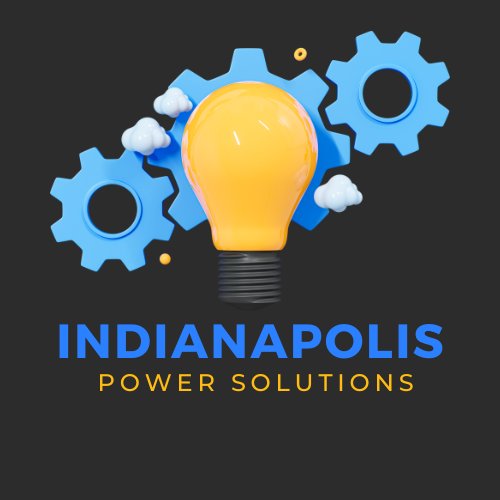
Whole House Generators in Edgewood IN
A whole house generator is a powerful backup power system designed to provide electricity to an entire home during power outages. Unlike portable generators, which can only power a few essential appliances, a whole house generator is connected directly to your home’s electrical system. When a power outage occurs, it automatically activates and supplies electricity to all the circuits in your home. This ensures that everything from your lights and refrigerator to your heating and cooling systems continues to operate without interruption. Whole house generators are especially valuable in areas where power outages can occur due to severe weather conditions or other unforeseen events. Whole house generators come in various types to meet different needs. The most common types include:
- Natural Gas Generators: These are connected to your home's natural gas line, providing a continuous fuel supply. They are efficient, and because they don't require fuel storage, they are often more convenient for long-term use.
- Propane Generators: These are similar to natural gas generators but use propane as their fuel source. Propane can be stored in tanks, making it a good option if natural gas is unavailable in your area.
- Diesel Generators: These use diesel fuel and are known for their durability and efficiency. Diesel generators are often used in commercial settings but can also be a good option for larger homes.
Each type has its own advantages, and the best choice depends on factors like availability of fuel, budget, and specific power needs.
How it Differs from Portable Generators
The key difference between whole house generators and portable generators is their capacity and level of automation. Portable generators are smaller, less powerful, and require manual setup and fueling. They are typically used for powering specific appliances or areas of the home during an outage. On the other hand, whole house generators are permanently installed and wired into your home's electrical system. They automatically detect power outages and start supplying power to the entire home within seconds, providing a seamless transition and ensuring that all your home’s systems remain functional.
Professional Installation vs. DIY
Installing a whole house generator is a complex task that involves electrical work, fuel connections, and potentially even modifications to your home’s infrastructure. Professional installation is highly recommended for several reasons:

We will get back to you as soon as possible.
Please try again later.
- Safety: Professional installers are trained to handle the electrical and fuel connections required for a whole house generator, ensuring that the installation is safe and up to code.
- Efficiency: A professional installation ensures that the generator is correctly sized and connected to your home’s electrical system, maximizing efficiency and reliability.
- Warranty: Many generator manufacturers require professional installation to maintain the warranty, protecting your investment.
While DIY installation might seem like a way to save money, the risks and potential complications often outweigh the benefits. A professional installation guarantees that your generator will function correctly when you need it most.
Maintenance and Troubleshooting
Like any other major home system, a whole house generator requires regular maintenance to ensure optimal performance. Common maintenance tasks include:
- Regular Inspections: Checking the generator’s components for wear and tear, leaks, or other issues.
- Oil and Filter Changes: Just like a car engine, a generator’s engine requires regular oil and filter changes to keep running smoothly.
- Battery Checks: Ensuring that the battery is charged and functioning properly so that the generator can start automatically during an outage.
- Fuel System Maintenance: For natural gas or propane generators, this involves checking the connections and fuel supply. For diesel generators, this includes checking the fuel quality and level.
Troubleshooting common issues, such as failure to start or reduced power output, can often be done by following the manufacturer’s guidelines. However, for more complex problems, professional service is recommended to prevent damage to the generator or your home’s electrical system.
Long-Term Savings and Investment Value
Investing in a whole house generator can lead to long-term savings in several ways:
- Avoiding Power Outage Costs: Power outages can lead to significant costs, such as spoiled food, hotel stays, or damage to your home’s systems. A whole house generator eliminates these potential expenses.
- Increasing Home Value: A whole house generator is a valuable asset that can increase your home’s resale value. Prospective buyers often see it as a major benefit, especially in areas prone to power outages.
- Insurance Discounts: Some insurance companies offer discounts for homes with whole house generators, recognizing the reduced risk of damage from power outages.
While the initial cost of a whole house generator is significant, these long-term savings and the added security make it a worthwhile investment.
What Are the Benefits?
The benefits of a whole house generator are numerous:
- Continuous Power Supply: No need to worry about losing power during storms or other emergencies.
- Automatic Operation: The generator starts automatically, so you don’t have to be home to turn it on.
- Comfort and Safety: Ensures that your home’s heating, cooling, and security systems remain operational during outages.
- Convenience: You won’t have to worry about manually setting up a portable generator or refueling it in the middle of an outage.
- Peace of Mind: Knowing that your home is protected during power outages brings peace of mind, especially in areas where outages are common.
What We Offer
We offer comprehensive services for
whole house generators in Edgewood, IN. Our services include:
- Residential Generators
- Commercial Generators
- Portable Generators
- Electric Generators
- Propane Generators
- Solar Generators
- Generator Repairs
- Generator Maintenance
- Generator Parts
We are committed to providing top-quality service and ensuring that your home remains powered, no matter what.
How to Choose the Right Generator for Your House
Choosing the right whole house generator involves considering several factors:
- Power Needs: Determine how much power your home requires during an outage. This will help you choose a generator with the appropriate capacity.
- Fuel Source: Decide whether you want a generator that runs on natural gas, propane, or diesel. Consider the availability and cost of fuel in your area.
- Budget: Whole house generators come in a range of prices, so it’s important to choose one that fits your budget while meeting your power needs.
- Brand and Reliability: Choose a reputable brand known for reliability and durability. Reading reviews and consulting with professionals can help you make an informed decision.
- Warranty and Support: Look for generators that come with a strong warranty and good customer support. This ensures that you’ll be covered if any issues arise.
Importance of Reliable Power in Homes
Reliable power is crucial for maintaining comfort, safety, and convenience in your home. Power outages can disrupt daily life, leading to discomfort, inconvenience, and potential hazards. With a whole house generator, you can avoid these issues and ensure that your home remains functional during emergencies. Reliable power is especially important for homes with vulnerable residents, such as the elderly or those with medical conditions, where a loss of power could be life-threatening.
Frequently Asked Questions (FAQs)
- How long can a whole house generator run continuously?
- Most whole house generators can run continuously for several days, as long as they have a steady fuel supply. Regular maintenance is required to ensure they operate efficiently during extended use.
- Do whole house generators require permits for installation?
- Yes, in most areas, permits are required for the installation of a whole house generator. A professional installer can handle this process for you.
- Can a whole house generator power an air conditioner?
- Yes, whole house generators are designed to power large appliances like air conditioners. It’s important to choose a generator with enough capacity to handle your home’s power needs.
- How often should a whole house generator be serviced?
- Regular maintenance should be performed at least once a year or after every 200 hours of use, whichever comes first.
- Are whole house generators noisy?
- While whole house generators do produce some noise, modern models are designed to operate quietly. The noise level is usually similar to that of a central air conditioning unit.
If you’re considering a whole house generator for your home in Edgewood, IN, contact us today. Our team of experts is here to help you find the perfect solution for your needs, ensuring that your home remains powered and protected during any outage. Call us or visit our website to schedule a consultation. Don’t wait until the next power outage – secure your home’s power supply today!
Let's Connect!
Ensure your home stays powered. Our whole house generators are your best defense against unexpected outages, keeping your family safe and comfortable. Discover how whole house generators work and why they're crucial for your home. Check out our buyer's guide to find the perfect fit for your needs and protect against the common reasons for loss of power. Contact us now!